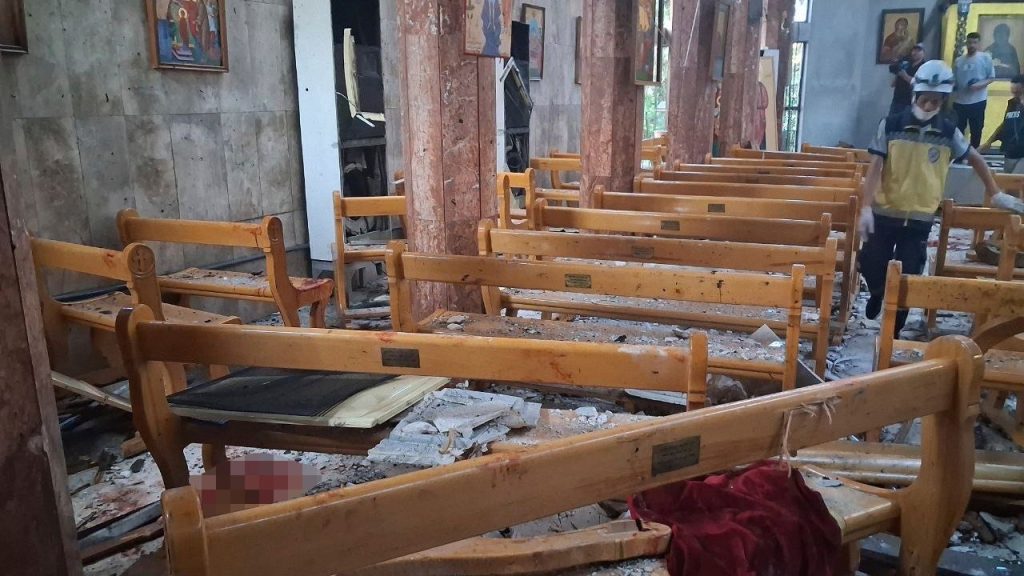Syria is grappling with mourning and chaos after a devastating suicide bombing at the Mar Elias Church in Dweil’a, which resulted in the tragic deaths of at least 25 individuals on a fateful Sunday. The authorities have acted swiftly, apprehending multiple suspects connected to the attack, as they strive to investigate claims of responsibility attributed to the Islamic State (ISIS). As the nation deals with the aftermath, the broader implications of this incident extend beyond the immediate violence, posing significant challenges to Syria’s ongoing stability.
| Article Subheadings |
|---|
| 1) Details of the Devastating Attack |
| 2) Security Forces’ Rapid Response |
| 3) Government Officials’ Stance |
| 4) ISIS Response and Regional Implications |
| 5) The Ongoing Struggle Against Terrorism |
Details of the Devastating Attack
On June 22, 2025, the Mar Elias Church in Dweil’a, located on the outskirts of Syria’s capital, Damascus, became the scene of a tragic suicide bombing. The attack occurred during a time of prayer, where worshipers were gathered in the church. The perpetrator first opened fire on those present before detonating himself, resulting in the immediate loss of 25 lives and injuring 63 others. The sheer brutality of the assault underscores the ongoing risks faced by civilians in the region, particularly within places of worship, a concern voiced by various community leaders.
Security Forces’ Rapid Response
In the wake of the bombing, the Syrian Interior Ministry announced a series of arrests tied to the attack. Interior Minister Anas Khattab indicated that the operation focused on locations associated with cells of ISIS, highlighting the government’s commitment to combating terrorism. Subsequent investigations led to the recovery of explosive devices and a booby-trapped motorcycle near Damascus, further emphasizing the planned nature of the attack. These rapid actions showcase the Syrian government’s attempts to regain public trust and ensure safety in a tumultuous environment.
Government Officials’ Stance
Syrian President Ahmed al-Sharaa has vowed to pursue justice for the victims of the church bombing. He pledged that authorities would work tirelessly to capture all involved in this heinous crime. The government’s strong rhetoric aims to bolster faith among the populace regarding their safety. Meanwhile, spokesman for the Interior Ministry, Noureddine Al-Baba, expressed his belief that ISIS was likely behind the attack, positioning it as part of a larger effort to destabilize the nation. Al-Baba’s comments reflect ongoing frustrations within the government regarding the persistent threat from ISIS.
ISIS Response and Regional Implications
While no organization immediately claimed responsibility for the bombing, the assumption of ISIS involvement has alarming implications on regional security dynamics. The attack occurred against the backdrop of heightened political unrest and military actions linked to the ongoing tensions involving Iran and Israel. Officials fear that acts similar to this may exacerbate already fragile relations within the Middle East. The implications of this attack extend beyond Syria, creating a ripple effect that could destabilize neighboring regions, contributing further to an atmosphere of chaos.
The Ongoing Struggle Against Terrorism
The fallout from the Dweil’a bombing highlights the enduring struggle against terrorism that Syria faces, particularly from ISIS remnants. As security forces continue to arrest suspects, officials have reiterated the importance of solidarity among the government and the populace in combating threats to national security. Furthermore, the government’s efforts are not solely directed at apprehending suspects; they also encompass community engagement aimed at building resilience against extremist ideologies. The incident underscores the continued necessity for a comprehensive approach to dismantling terrorist networks that threaten the safety of civilians.
| No. | Key Points |
|---|---|
| 1 | At least 25 individuals were killed in a suicide bombing at Mar Elias Church in Dweil’a. |
| 2 | Syrian authorities made arrests related to the bombing, focusing on ISIS cells. |
| 3 | Government officials emphasized a commitment to safety and a swift response to terrorism. |
| 4 | The attack raises concerns about regional security amidst ongoing Middle Eastern tensions. |
| 5 | Efforts to combat terrorism include not just military actions but also community engagement. |
Summary
The tragedy at Mar Elias Church marks a significant event in Syria’s ongoing battle against terrorism, highlighting vulnerabilities within the nation. Governmental rhetoric and prompt actions reflect an effort to instill confidence among the populace. However, the attack serves as a stark reminder of the persistent threats posed by extremist groups like ISIS, as well as the broader implications for regional security in the volatile Middle East. The recovery and rebuilding process will require not only security measures but also a concerted effort towards community resilience and solidarity.
Frequently Asked Questions
Question: What was the nature of the attack?
The attack was a suicide bombing that occurred during a prayer service at the Mar Elias Church, resulting in significant casualties.
Question: How did the government respond to the attack?
The Syrian government quickly announced arrests of individuals connected to the bombing and has committed to capturing all responsible parties.
Question: What are the broader implications of this attack?
This attack raises concerns about ongoing terrorist threats in Syria and the potential for instability throughout the Middle East due to rising tensions involving local and regional actors.


